Lodi councilmember Shakir Khan was arrested on February 16 for fourteen felony counts of alleged election fraud in a local election. Khan took advantage of members of his own community of Pakistani immigrants. "The alleged fraud took place June 1, 2020, through November 3, 2020," according to the county's website. The Sheriff's investigation began in 2019 with a broader investigation by the San Joaquin County Sheriff's Office of a "spike in criminal activity" and illegal gambling in multiple locations. However, the investigation soon turned up a second case related to election fraud. Shakir Khan was allegedly involved in both.
Sheriff Patrick Withrow's press conference on February 17 reveals his office's investigation into illegal internet gambling and election fraud in Lodi, CA. The full press conference from Jovan Hutton Pulitzer's Rumble channel is shown below:
Concerning illicit gambling, the Sheriff convinced most of the illegal gambling locations to shut down without resistance. However, one of the locations refused to stop its activity, the American Smoker's Club on Waterloo Road, owned by Khan. Khan was also allegedly "laundering money back to his home country, Pakistan." The illegal gambling/money laundering investigation is ongoing but ultimately led to the election fraud operation. Khan was allegedly running out of his "modest three-bedroom home" in Lodi, where Khan resides with his wife, inlaws, and two children.
 Shakir Khan/SJC presentation/https://prezi.com/view/kCbFVzPPKmPrA39dBxTt/
Shakir Khan/SJC presentation/https://prezi.com/view/kCbFVzPPKmPrA39dBxTt/
Remarkably, it was an indefatigable Sheriff, Patrick Withrow, and his deputies in San Joaquin County outside of Stockton, CA, who "used the legal system" to pursue and arrest Khan with the help of concerned citizens. They found that Khan allegedly exploited every possible gap and loophole in the county's voter registration system while running for a city council seat in District 4 during the 2020 election. He ultimately "won" the seat.
Khan's Activities During the Runup to the 2020 Election
Throughout his candidacy, Khan allegedly managed to register fictitious voters fraudulently, cast fraudulent ballots, exploit immigrants who were naive to their voting rights, collect fraudulent ballots, forge signatures, and more. Withrow and his deputies found 41 sealed and completed mail-in ballots in a box at Khan's home.
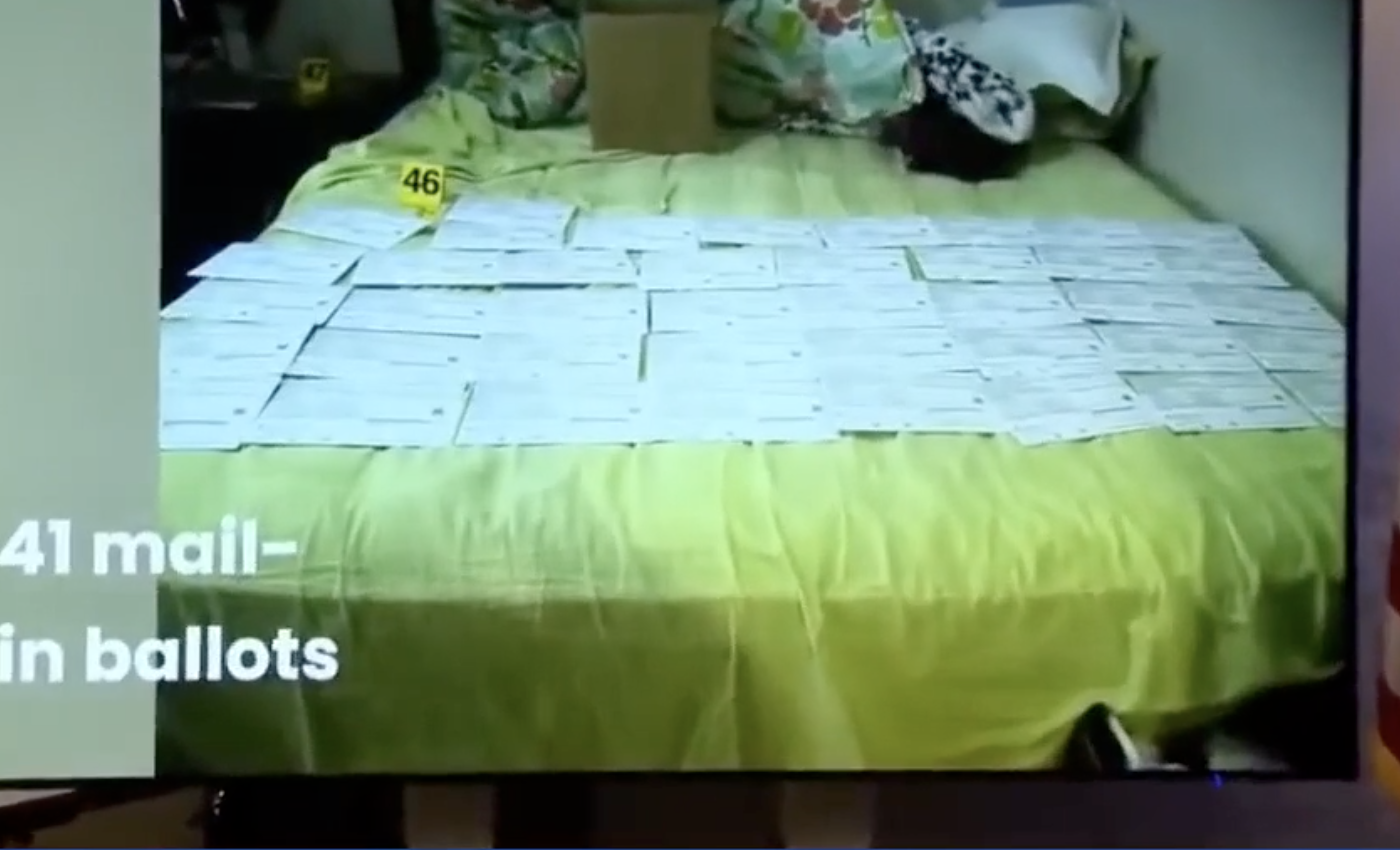 Ballots in a Box/Shakir Khan's Home
Ballots in a Box/Shakir Khan's Home
Those mail-in ballots were the first in a trail of evidence leading to Khan's election fraud arrest. The press release pictured below shows a full accounting of Khan's alleged fraudulent activities:
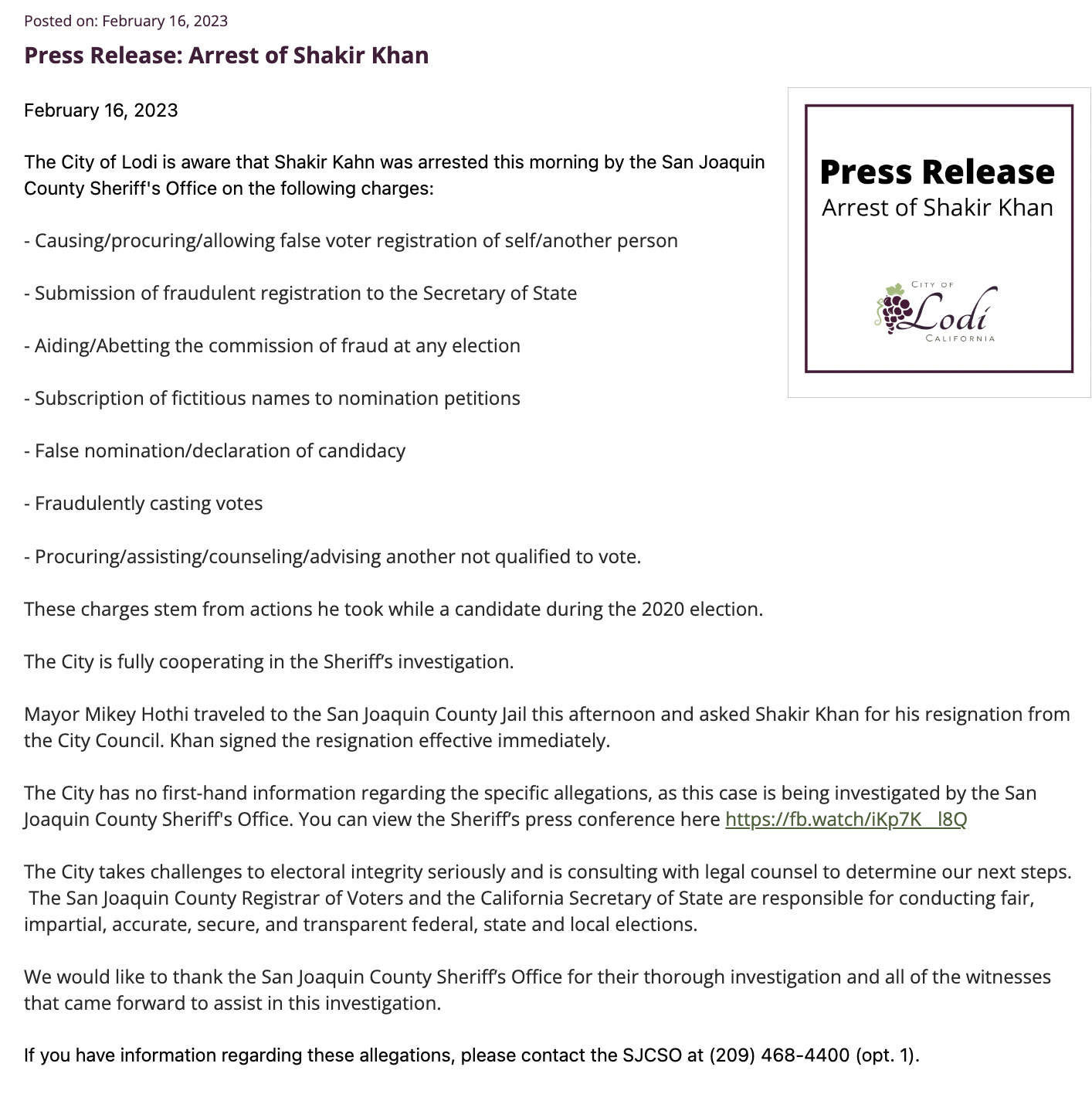 Lodi Press Release/February 16/Shakir Khan
Lodi Press Release/February 16/Shakir Khan
Captain Harty Goes Through Timeline of Khan's Fraudulent Activities
During the Sheriff's February 17 press conference, Captain Art Harty spoke in detail about the case that began in 2019 as an illegal gambling case. He states Khan was ultimately arrested for a second set of illegal actions related to election fraud. Khan's election fraud activities came to light, in part, because in 2021, citizens were much more actively concerned about fraud in the 2020 election.
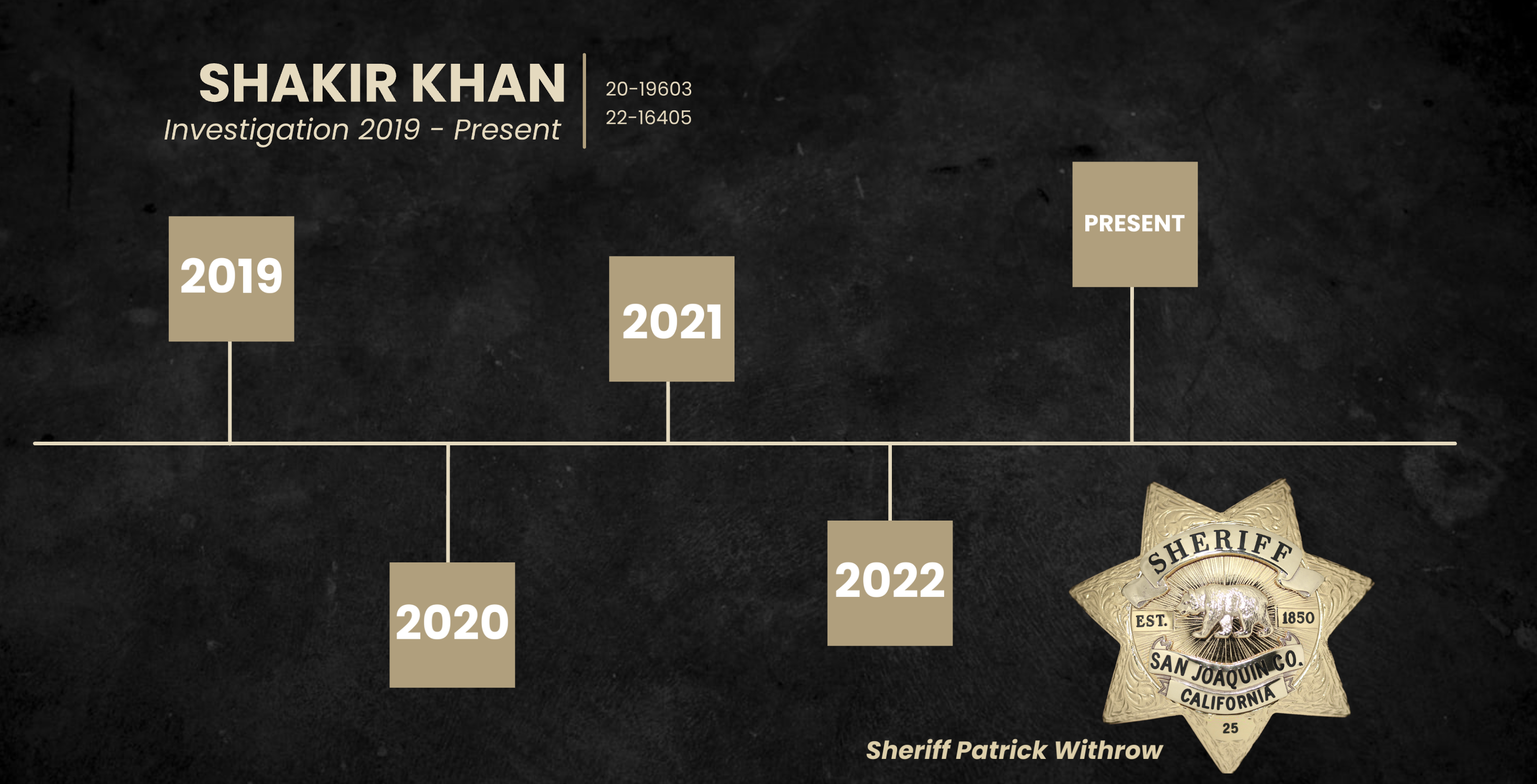 Timeline/Shakir Khan/https://prezi.com/view/kCbFVzPPKmPrA39dBxTt/
Timeline/Shakir Khan/https://prezi.com/view/kCbFVzPPKmPrA39dBxTt/
"People," said Harty, "were complaining around the nation about their concern with the way the 2020 election was run, the shortcomings, and our county was no different." Harty explained that as the 2022 midterms "began to spin up," many concerned citizens were reaching out and attending Board of Supervisors meetings. More remarkably, however, he shared that he and other representatives from the Sheriff's office also attended community meetings and were actively receptive to the distress over the conduct of elections in the county. Harty continued:
"They would attend our local board meetings and voice their concerns and ask for a change back to the way things used to be with one-day voting in person, no drop boxes, [and] things of that nature. They were very vocal at these board of supervisors meetings and, as we attend those, we listened to what they had to say."
Ultimately a woman contacted the Sheriff's office with evidence related to voter rolls in the county. She had looked into the voter rolls because of "stuff going on with [her] grandma." The woman showed Sheriff Withrow her analysis of the voter rolls, which showed "some anomalies and weird things." However, a particular address on the voter rolls in District 4 piqued his interest. With her help, Sheriff Withrow and his deputies made a voter roll connection with the 41 ballots they found at Khan's address.
In the end, the 41 entries grew to "roughly 70 names" that were, according to Harty, "registered to share either Shakir Khan's house address, his e-mail or his phone number. That is 70 people that he was able to register using some sort of combination thereof. Through our previous investigation, we had access to his e-mails, and we did an analysis of those e-mails. We found all the receipts from the Secretary of State's office saying, 'we received your request to vote online or to register to vote. If this was criminal, we were going to do something about it."
The Sheriff's office went a step further, knowing that records from the 2020 election would soon be purged. With cooperation from the San Joaquin County Registrar of Voters Office, Sheriff Withrow's office "executed a warrant to preserve all documents" related to the 2020 election.
The Sheriff's department turned up a myriad of ways Khan flouted the law during their investigation. As they went through the voter rolls, they pulled ballot envelopes, many of which seemed to be forged—all the handwriting was "strikingly" the same.
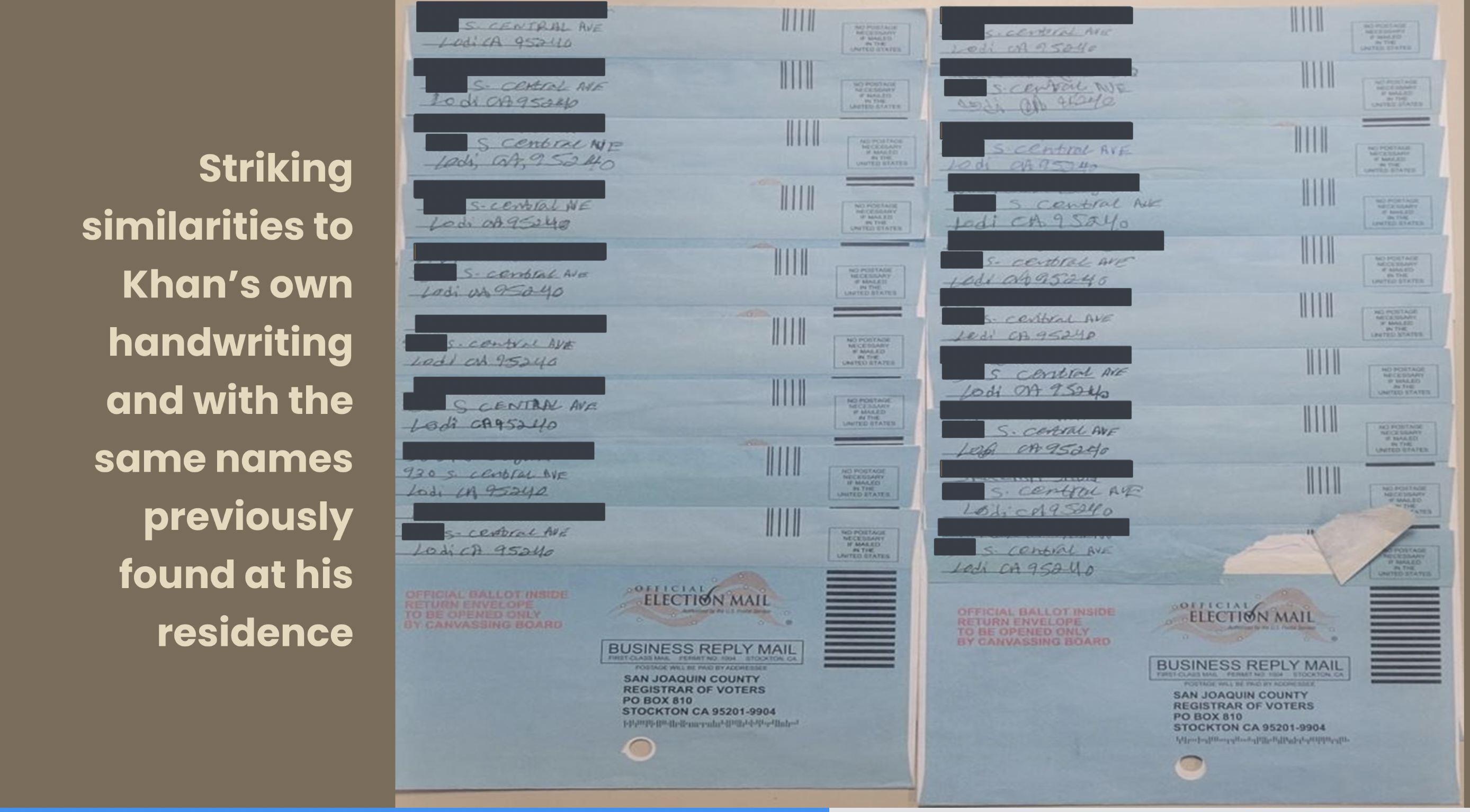 Shakir Khan/Handwriting/https://prezi.com/view/kCbFVzPPKmPrA39dBxTt/
Shakir Khan/Handwriting/https://prezi.com/view/kCbFVzPPKmPrA39dBxTt/
After Khan was arraigned for the illegal gambling charges, he signed an "own recognizance" (OR) agreement with the court in 2021. He violated it multiple times by going on personal and "tax-payer-funded" trips out of state.
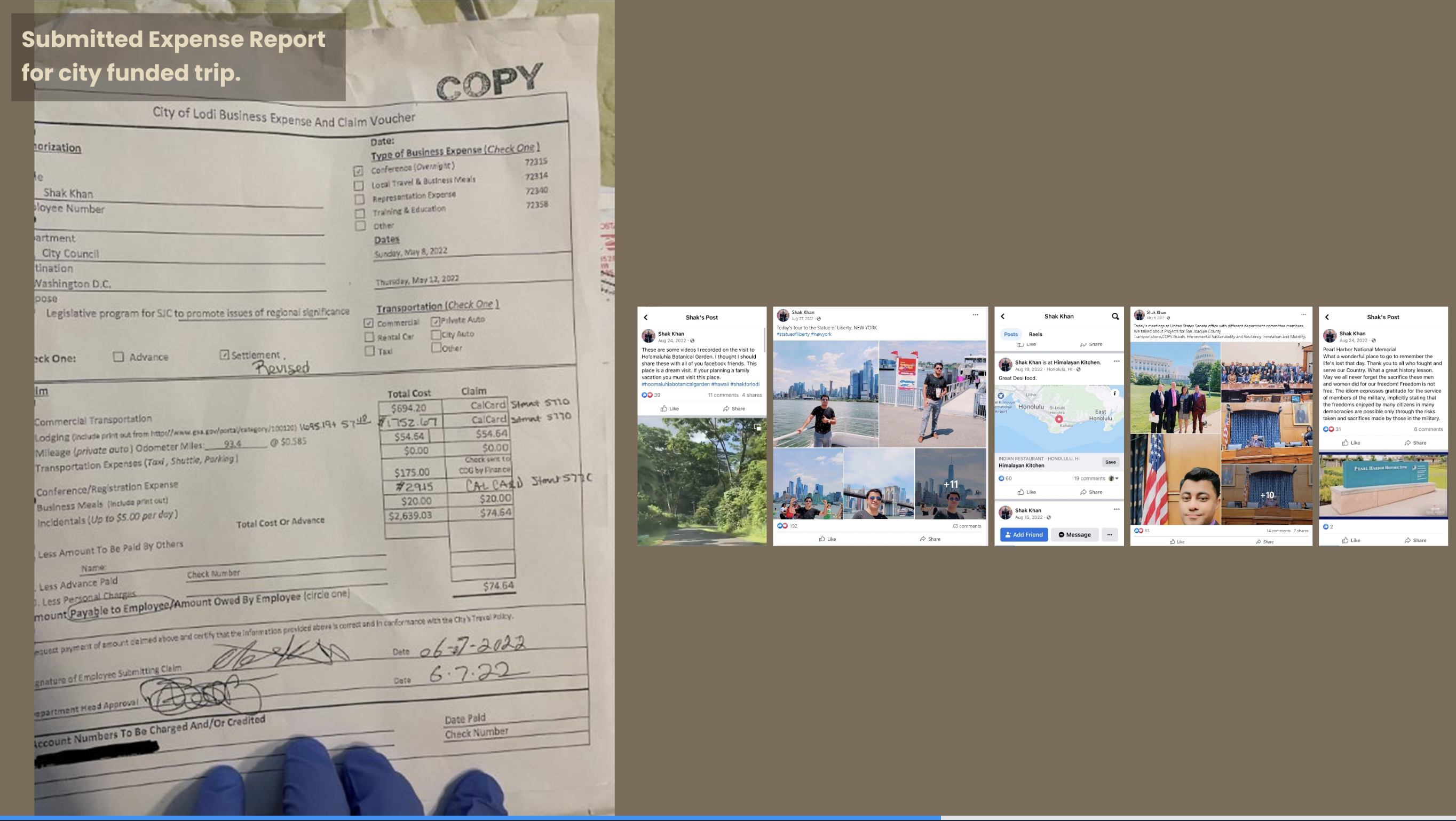 Trips Shakir Khan/
Trips Shakir Khan/
Those trips led to an ankle monitor on a "sitting council member" and "the only one we are aware of ever needing one of those," according to Harty. Because Khan violated his OR, the Sheriff's department checked on him at his residence. There they found a set of unopened ballots just prior to the 2022 election.
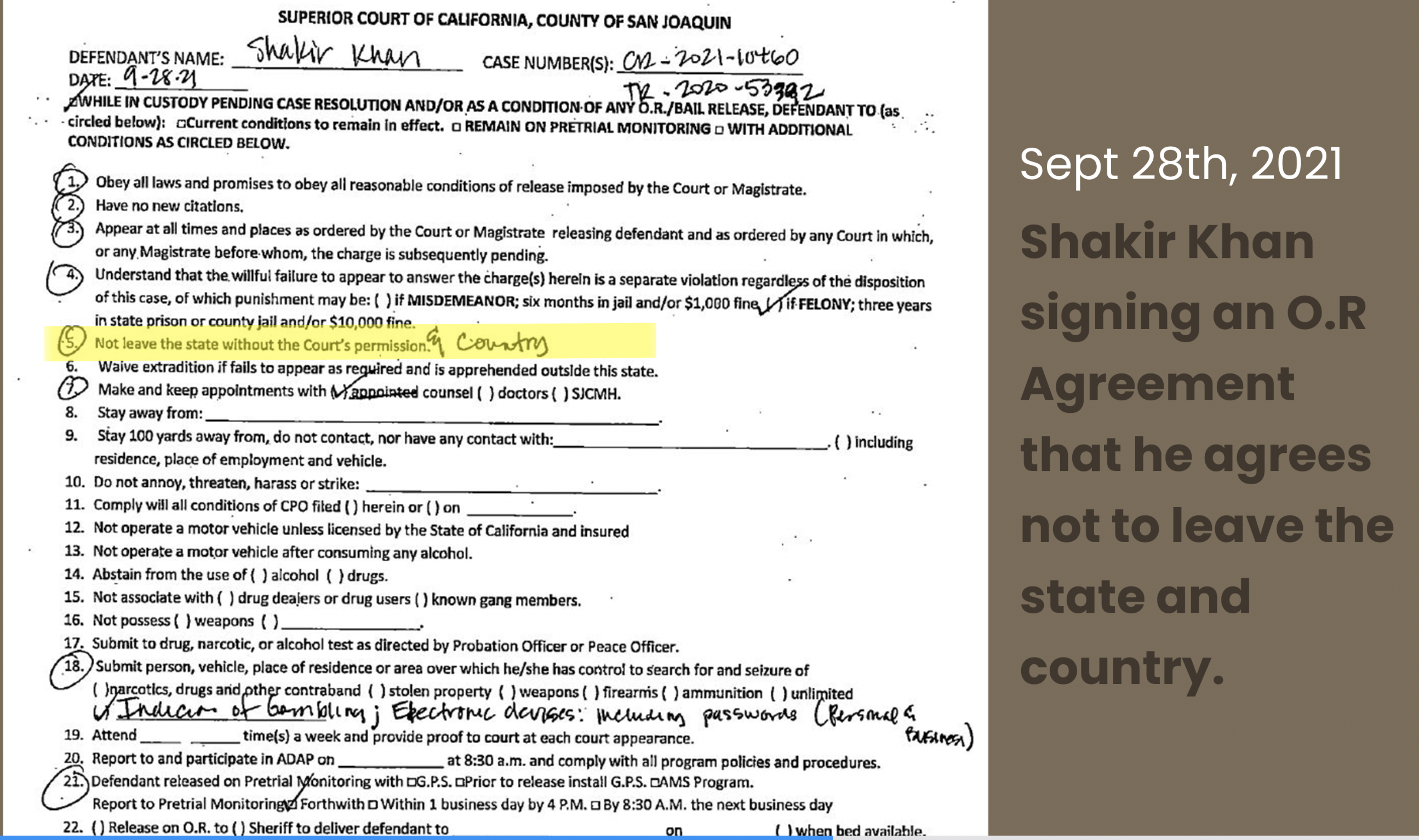 OR Agreement/Shakir Khan
OR Agreement/Shakir Khan
During the same home search, they found Khan's candidacy papers and several concerning anomalies. Apparently, in anticipation of his candidacy in 2020, Khan switched ownership of his illicit American Smokers Club business to his brother, who flew to the U.S. to change the business to his name. However, when Khan filled out his candidacy paperwork, he said he was the club's owner, not his brother. As Harty stated, "candidacy paperwork is a pledge you make to say you are going to run an ethical campaign."
Even more concerning, the Sheriff's office found signatures collected by Khan that seemed to be fraudulent, including the signature of his brother, who was neither a citizen nor was he in the country at the time. Upon further scrutiny, comparing the document with the DMV database, the Sheriff's office found a "number of forgeries on the candidacy paperwork. This is problematic for Shakir Khan because when you submit this document to the registered voter, you submit it under penalty of perjury." The candidate submits this document with the understanding that they are "true, accurate, correct and that he signed or he witnessed somebody sign each and every one of those things."
The findings on the candidacy paperwork led the Sheriff's department to conduct a canvass of the community to help them understand what Khan had been asking of his neighbors. Captain Harty showed a "sampling of videos" taken during the department's December 2022 canvass with a bodycam. Each one shows people talking about how Khan allegedly coerced and conned his neighbors into cooperating with him during the days and months before the election.
Harty stated: "Each video interview shows some element of intimidation or unauthorized use of another person's identifying information. There are some privacy concerns—when you vote, you are supposed to be able to vote in private." Khan allegedly misled or coerced his neighbors in the following ways, according to the bodycam video:
- Khan signs the voter's name for him. He misspells the voter's name, which leads to the conclusion that the signature was forged. The voter confirms Khan signed for him.
- Khan pressured another voter to vote once for Khan and a second time for Biden.
- Khan pressured the voter to register to vote.
- The voter tells the deputy that Khan completed a ballot for him prior to visiting him and has the voter sign the ballot envelope. This voter "didn't even live in the district," but Khan registered that voter to his residence.
- Another voter told Sheriff that Khan filled out the ballot for him in his presence.
- Another voter told Sheriff that Khan used her personal information without consent and attached his own e-mail or identifying information to her registration.
After the canvass, Khan got wind of the canvass and had the cajones to post on Facebook live, telling people in the community in his native language (Urdu) that "if someone or anyone comes, tell them that you did the vote yourself no one helped you fill out the vote. You... [filled] out the vote in your own hands."
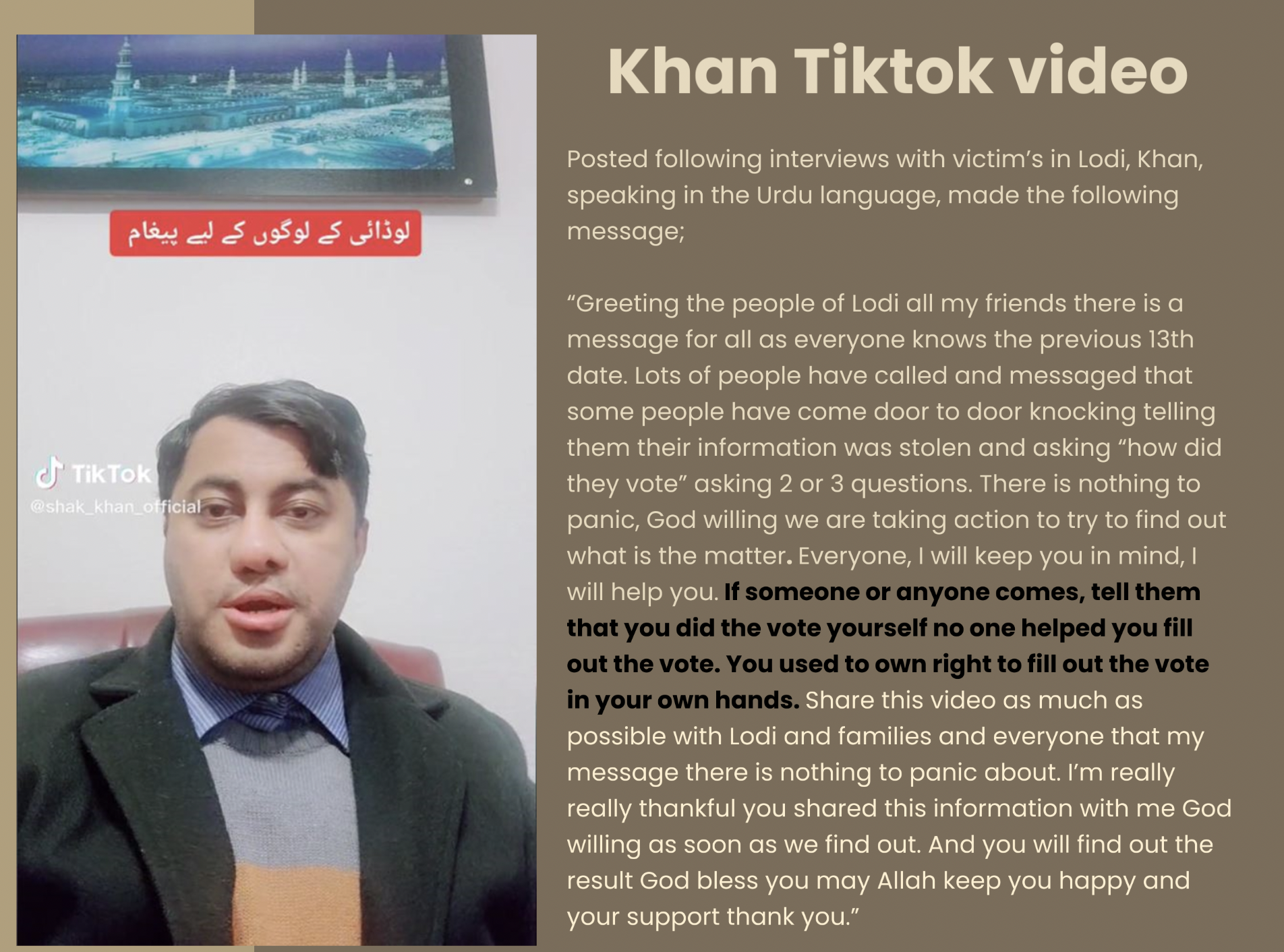 Shakir Khan/Facebook Live
Shakir Khan/Facebook Live
What are the Exploitable Loopholes in Joaquin County?
During the investigation, the Sheriff's department unearthed several concerning gaps, loopholes, and "workarounds" in the voting process in San Joaquin County that allowed Khan to carry out his schemes. Sheriff Withrow emphasized that Khan was able to pull this off because it is a "state system that allowed him to register voters without their even knowing they were registered." Sheriff Withrow, Captain Harty, and the Voter Registrar explained:
- You can register and cast a vote even if you don't live in the county.
- The voter registration system is based on the "honor system. All you have to do is click the box and say you're not lying. And then you'll get an e-mail from the Secretary of State or mailing saying 'thank you' for entering the vote. And there you are. You're on the rolls anytime the election comes around, and you will be mailed a ballot."
- The signature verification process is deeply flawed. Sheriff Withrow clarified, "if you register online, put your e-mail address and everything else that we saw that Councilman Khan was doing. Then they mail him that ballot. The first signature either the state or local sees is him signing it. So if he registers "Pat Withrow" and writes "Pat Withrow" from now on, that's going to be with his signature every time they check it in there. So if you don't know about that, I didn't know about it; the signatures would match because he writes it every single time."
- The online registration system allows for workarounds, and the DMV system does not always "talk with" the voter registration system. According to the registrar:
"Paper filings are our responsibility, but these (Khan's) were online registrations done with the online registration process through the Secretary of State. Those forms are then forwarded to our office, and there is a verification process. But it appears that there's been a workaround of that process and so now we're going to actively have to look into that.
The ones referred to here came through as online registration, so they are put into a state database called VoteCal and then brought down to our system. Then the verification process is simply verifying that there's a driver's license and a four-digit Social Security number. If those are present, then they are able to move from the pending status to active status.
When the voter does the online application, he doesn't provide a signature. The first signature we're going to see is the first mailing that we received back from them. Sometimes we get information over with a signature on a DMV application, but we only receive those if a voter goes to the DMV and checks the box saying, 'Please update my registration' then we're allowed to see that image. We do not get that image unless that box is checked.
The Sheriff's department also discovered many corrupt voter files in the process of their investigation. Harty stated:
"There were about 93 people who were registered to vote on the voter rolls whether they cast a ballot or not. Many were on the voter rolls with a birth date of 1850. There were 232 people registered to vote with an address for local prisons. There were 4144 people who were 90 years old or older. There were 125 people registered to vote or on the voter rolls that were registered to or at an address that goes back to a nonprofit, an NGO or a different business.
300 people applied with no first name, just the last name. There were about 110 people who were possibly double voters. Basically, the same name, date of birth, and address, but two different voter ID numbers. Some voters registered to vote at various shelters. We also found a voter with the name of Jesus Christ."
Sheriff Withrow shared with reporters that he would pursue any reports of election and voter fraud and voiced confidence in the ability to fix things in the future.
"So here we're confident in our register of voters and the way we do things here, and we know that we will continue to monitor this and hold anyone accountable in our county or anywhere that we find them— those who are violating the sacred trust that we have here in our country. And just know if you try this in our county, we're coming after you, and we continue to look at anything that comes our way."
A reporter asked Withrow whether he thought Khan's activities affected the election results. He said what they found during their investigation was both "shocking and eyeopening" adding:
"If you are asking me, yes, I think he did. Clearly, he was out influencing people unethically and illegally. Clearly, he submitted his candidacy forms which were not legitimate. So he should have never been on the ballot in the first place. There's no question in my mind that it influenced the outcome of this election. That is why this morning, after we took him in custody, we met with the city manager of Lodi and the chief of Police of Lodi. They got with their legal counsel, and they're starting to look into all the ramifications that may come from his illegal activity."
Sheriff Withrow added his thoughts on how average citizens can help avoid this type of election fraud in the future:
"A lot of times people come to us, and they say, hey, you know, what can we do? Well, my recommendation is to create a relationship with the registrar, with your local Sheriff, with your Board of Supervisors. Just make sure that your county, wherever it is, is secure as much as it can be."


